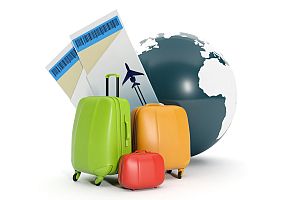Frequent travel for work can have a big impact on your overall health. If you spend more time on the road than you do in the office or at home, you know the difficulty of managing the details of your business appointments, travel accommodations, and keeping records that give you a professional edge. Trying to stay on track with your exercise routine, diet and sleep schedule may seem like an impossible feat. But taking a proactive approach to staying healthy on the road may be simpler than you think.
Attitude Is Everything
One of the biggest reasons that road warriors’ health tends to suffer during their travels is that they often start with the wrong mindset. For many, this begins with accepting the idea that frequent travel commitments just don’t leave room for healthy habits. But the truth is usually more nuanced than this. What it really takes is a combination of determination and flexibility plus a little advanced planning. Once you make nutrition, exercise and sleep priorities, finding ways to make healthy lifestyle habits sustainable is much easier to do.
Fitting Workouts into Any Schedule
Regardless of what time of day you have to fit a workout in, make it a priority. When you can get accommodations at a hotel or motel that has a gym, you always have an advantage. Otherwise, call local gyms to see which ones offer a one day workout pass. If going to a gym is not an option, find another way to get your exercise in. Body weight workouts can offer a very effective alternative. It’s also possible to design an exercise plan around simple equipment that fits easily into your luggage—resistance bands are just one creative solution. For those who need a bit more structure, workout videos on laptops and tablets are just a couple of mouse clicks or finger gestures away. Leaving your hotel room altogether opens up a whole world of other exercise possibilities. Take advantage of the kids’ playground at a local park or find some hiking or jogging trails.
Getting Good Nutrition
Eating healthy meals on the move is a lot easier today than it once was, thanks to the addition of more and generally better food choices at many airports, hotels and roadside restaurants. Some things to look for are:
- Salads
- Grilled chicken, turkey and fish
- Fruits and nuts with high anti-oxidant counts (like avocado and almonds)
- Egg whites instead of the whole egg
Many restaurants now offer more detailed nutritional information that gives you more control over portion size as well as how much fat, sugar and sodium you consume. But—once again—this information is only helpful if you actually use it!
The Value of Sleep
Getting enough rest is an important component of overall good health that too many people simply overlook these days. But it can be especially difficult for frequent travelers to get the amount and quality of sleep they need to be healthy and at their best. To make it easier to fall asleep and stay asleep until you’re ready to start your next day, minimize the amount of light and noise in your room and resist the temptations of screen time before you turn it. It’s also a good idea to have a consistent bedtime and to avoid large meals in the hours before going to bed.
It’s important to remember that there is a fundamental difference between occasional travel that interrupts your normal lifestyle rhythms for a short time and frequent or constant travel that actually defines many of those rhythms. If your work requires you to be on the move often, it’s up to you to develop more flexible strategies that give your body what it needs. Over the long run, this will help ensure that you stay healthier, happier and more productive!

